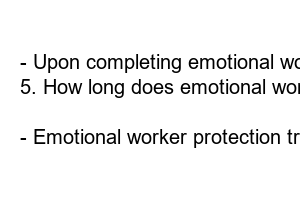감정노동자 보호교육 신청
Title: Applying for Emotional Worker Protection Training: Empowering Yourself for a Fulfilling Career
Introduction:
Are you passionate about helping others and want to make a meaningful impact in the lives of vulnerable individuals? Becoming an emotional worker could be just the right path for you! Emotional workers provide crucial support, empathy, and guidance to those in need. However, embarking on this journey requires proper training and preparation. In this blog post, we will explore how applying for emotional worker protection training in English can equip you with the necessary skills and knowledge to thrive in this fulfilling career.
1. The Importance of Emotional Worker Protection Training:
Emotional worker protection training aims to ensure the well-being and safety of both emotional workers and the individuals they assist. This training equips you with the fundamental knowledge to navigate challenging situations, set boundaries, and understand the legal and ethical aspects of this profession.
2. Key Components of Emotional Worker Protection Training:
Emotional worker protection training covers various components essential for success in this role. It includes comprehensive modules on active listening techniques, de-escalation strategies, self-care practices, confidentiality protocols, and cultural sensitivity.
3. Enhancing Communication Skills:
Effective communication lies at the heart of emotional work. Through training, you will learn how to communicate with empathy and compassion, building trust and rapport with those you assist. These skills enable you to establish a safe and supportive environment for clients.
4. Recognizing and Addressing Burnout:
Emotional work can be emotionally demanding, making burnout a potential risk. Training equips you with strategies to recognize and manage the signs of burnout, ensuring your own well-being while maintaining the level of care and support your clients deserve.
5. Ethical Considerations in Emotional Work:
Emotional worker protection training emphasizes the importance of adhering to ethical guidelines. You will learn about maintaining professional boundaries, treating all individuals with respect and dignity, and upholding confidentiality. These principles ensure that your work is conducted in a moral and responsible manner.
6. Practical Experience and Mentoring:
Many emotional worker protection training programs offer opportunities for practical experience and mentoring. Having a mentor can provide invaluable insights, guidance, and support as you navigate the complexities of emotional work. Practical experience allows you to put your newly acquired skills into practice, developing confidence and competence.
7. How to Apply for Emotional Worker Protection Training:
To apply for emotional worker protection training, research reputable training programs and organizations that offer this specific training in English. Consult their websites or reach out directly to inquire about the application process, requirements, and any upcoming training sessions. Remember to highlight your passion for helping others and why you believe emotional work is the right fit for you.
Summary:
Applying for emotional worker protection training in English enables individuals to embark on a career dedicated to supporting and empowering those in need. By equipping yourself with essential skills, such as communication, active listening, and recognizing burnout, you can provide effective and compassionate care to clients. Emphasizing ethical considerations ensures professional integrity, while practical experience and mentoring enhance practical skills and confidence. If you’re eager to make a positive impact on the lives of others, consider pursuing emotional worker protection training and begin a fulfilling journey in the field of emotional work.
FAQs:
1. What are the prerequisites for emotional worker protection training?
– Most training programs require a genuine interest in helping others and may have age or educational requirements that vary based on the organization.
2. Can I pursue emotional worker protection training online?
– Yes! Many accredited training programs offer online courses, making it convenient for individuals with busy schedules or limited access to in-person training.
3. Is emotional worker protection training recognized internationally?
– While specific certifications may vary, emotional worker protection training is designed to equip individuals with transferrable skills applicable to emotional work globally.
4. What career opportunities are available after emotional worker protection training?
– Upon completing emotional worker protection training, professionals can pursue employment in various settings, including counseling centers, non-profit organizations, hospitals, and schools.
5. How long does emotional worker protection training typically take?
– The duration of training programs can vary but often range from a few months to a year, depending on the depth and breadth of the curriculum.
6. Is emotional worker protection training only for new professionals or can experienced individuals also benefit?
– Emotional worker protection training is beneficial for both new professionals seeking to enter the field and experienced individuals looking to enhance their knowledge, skills, and ethical understanding.

